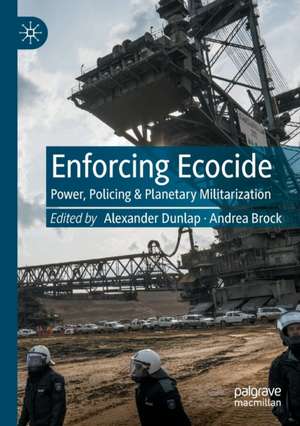Enforcing Ecocide: Power, Policing & Planetary Militarization
Editat de Alexander Dunlap, Andrea Brocken Limba Engleză Paperback – 2 iul 2023
| Toate formatele și edițiile | Preț | Express |
|---|---|---|
| Paperback (1) | 781.45 lei 6-8 săpt. | |
| Springer International Publishing – 2 iul 2023 | 781.45 lei 6-8 săpt. | |
| Hardback (1) | 786.66 lei 6-8 săpt. | |
| Springer International Publishing – iul 2022 | 786.66 lei 6-8 săpt. |
Preț: 781.45 lei
Preț vechi: 952.99 lei
-18% Nou
Puncte Express: 1172
Preț estimativ în valută:
149.54€ • 155.24$ • 124.70£
149.54€ • 155.24$ • 124.70£
Carte tipărită la comandă
Livrare economică 24 martie-07 aprilie
Preluare comenzi: 021 569.72.76
Specificații
ISBN-13: 9783030996482
ISBN-10: 3030996484
Ilustrații: XIX, 336 p. 19 illus., 6 illus. in color.
Dimensiuni: 148 x 210 mm
Greutate: 0.43 kg
Ediția:1st ed. 2022
Editura: Springer International Publishing
Colecția Palgrave Macmillan
Locul publicării:Cham, Switzerland
ISBN-10: 3030996484
Ilustrații: XIX, 336 p. 19 illus., 6 illus. in color.
Dimensiuni: 148 x 210 mm
Greutate: 0.43 kg
Ediția:1st ed. 2022
Editura: Springer International Publishing
Colecția Palgrave Macmillan
Locul publicării:Cham, Switzerland
Cuprins
Chapter 1. Introduction: Securing Ecological Destruction (by Alexander Dunlap and Andrea Brock ).- Part 1: Hydrocarbon Militarization.- Chapter 2. A Postcolonial History of Accumulation by Contamination in the Gulf (by Michael Hennessy Picard & Tina Beigi).- Chapter 3. Beyond Rentier State and Climate Conflict: Clashing Environmental Imaginaries and Ecological Oppression in Iran (by Maziar Samiee).- Chapter 4. Policing Indigenous Land Defense and Climate Activism: Learnings from the Frontlines of Pipeline Resistance in Canada (by Jen Gobby and Lucy Everett).- Part 2: Enforcing Extraction.- Chapter 5. Global Britain and London’s Mega-mining Corporations: Colonial Ecocide, Extractive Zones, and Frontiers of Martial Mining (by Daniel Selwyn).- Chapter 6. The Self-Reinforcing Cycle of Ecological Degradation & Repression: Uprooting the Ecological Coast of Policing & Militarization (by Alexander Dunlap).- Chapter 7. Oil, Arms and Emissions – The Role of the Military in a Changing Climate (by Wendela de Vries).- Part 3: Policing Ecosystems.- Chapter 8. If the Army Cuts Trees, Why Can’t We? Resource Extraction, Hunting and the Impacts of Militaries on Biodiversity Conservation (by Anwesha Dutta and Trishant Simlai).- Chapter 9. Policing the High Speed 2 (HS2) train line – repression and collusion along Europe’s biggest infrastructure project (by Andrea Brock and Jan Goodey).- Chapter 10. Ecological Terror and Pacification: Counterinsurgency for the Climate Crisis (by Peter Gelderloos).- Part 4: Looking forward.- Chapter 11. Demilitarize for a Just Transition (by Matthew Burke and Nina L. Smolyar).
Notă biografică
Alexander Dunlap is a postdoctoral research fellow at the Centre for Development and the Environment, University of Oslo. His work has critically examined police-military transformations, market-based conservation, wind energy development and extractive projects more generally in both Latin America and Europe. He is the author of two books: Renewing Destruction: Wind Energy Development, Conflict and Resistance in a Latin American Context (2019, Rowman & Littlefield) and The Violent Technologies of Extraction (2020, Palgrave).
Andrea Brock is a lecturer at the Department of International Relations, Centre for Global Political Economy and STEPS Centre at the University of Sussex. Her work examines a wide range of techniques and technologies to manage anti-extractive projects, including criminalisation and co-option of dissent and greenwashing. She is interested in political ecologies of mining, corporate power, and statism.
Andrea Brock is a lecturer at the Department of International Relations, Centre for Global Political Economy and STEPS Centre at the University of Sussex. Her work examines a wide range of techniques and technologies to manage anti-extractive projects, including criminalisation and co-option of dissent and greenwashing. She is interested in political ecologies of mining, corporate power, and statism.
Textul de pe ultima copertă
Policing and ecological crises – and all the inequalities, discrimination, and violence they entail – are pressing contemporary problems. Ecological degradation, biodiversity loss, and climate change threaten local communities and ecosystems, and, cumulatively, the planet as a whole. Police brutality, wars, paramilitarism, private security operations, and securitization more widely impact people – especially people of colour – and habitats. This edited collection explores their relationship, and investigates the numerous ways in which police, security, and military forces intersect with, reinforce, and facilitate ecological and climate catastrophe. Employing a case study-based approach, the book examines the relationships and entanglements between policing and ecosystems, revealing the intimate connection between political violence and ecological degradation.
Alexander Dunlap is a postdoctoral research fellow at the Centre for Development and the Environment, University of Oslo. His work has critically examined police-military transformations, market-based conservation, wind energy development and extractive projects more generally in both Latin America and Europe. He is the author of two books: Renewing Destruction: Wind Energy Development, Conflict and Resistance in a Latin American Context (2019, Rowman & Littlefield) and The Violent Technologies of Extraction (2020, Palgrave).
Andrea Brock is a lecturer at the Department of International Relations, Centre for Global Political Economy and STEPS Centre at the University of Sussex. Her work examines a wide range of techniques and technologies to manage anti-extractive projects, including criminalisation and co-option of dissent and greenwashing. She is interested in political ecologies of mining, corporate power, and statism.
Andrea Brock is a lecturer at the Department of International Relations, Centre for Global Political Economy and STEPS Centre at the University of Sussex. Her work examines a wide range of techniques and technologies to manage anti-extractive projects, including criminalisation and co-option of dissent and greenwashing. She is interested in political ecologies of mining, corporate power, and statism.
Caracteristici
A unique analysis of policing as a central driver of climate change and ecocide Offers a novel, case study-based approach to this important topic An invaluable reference for researchers interested in the links between environmental conflict and policing
